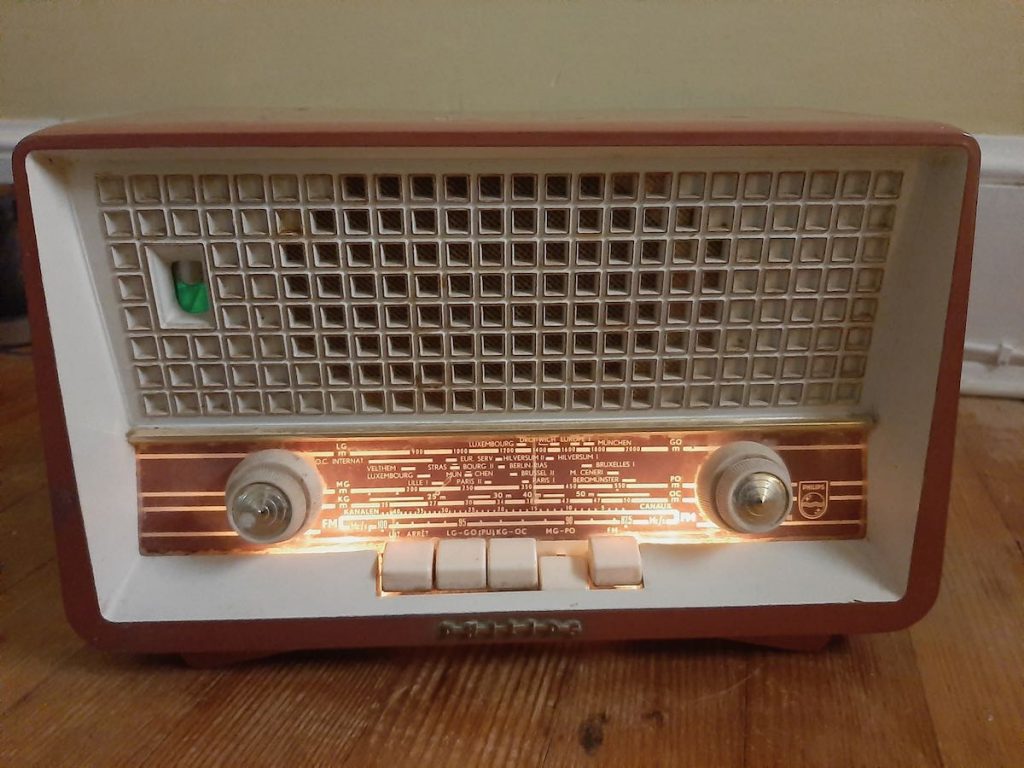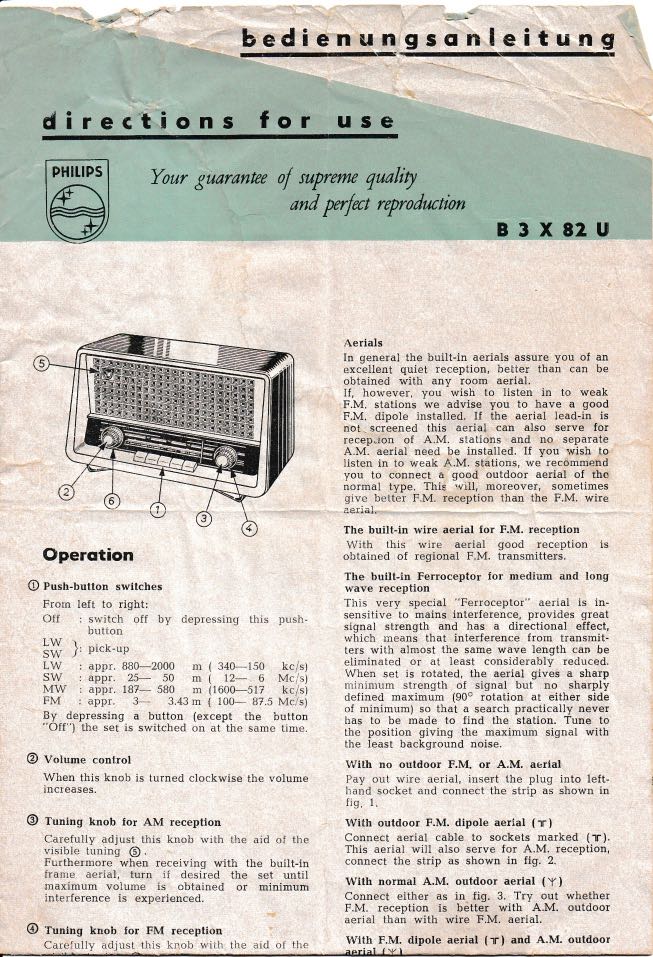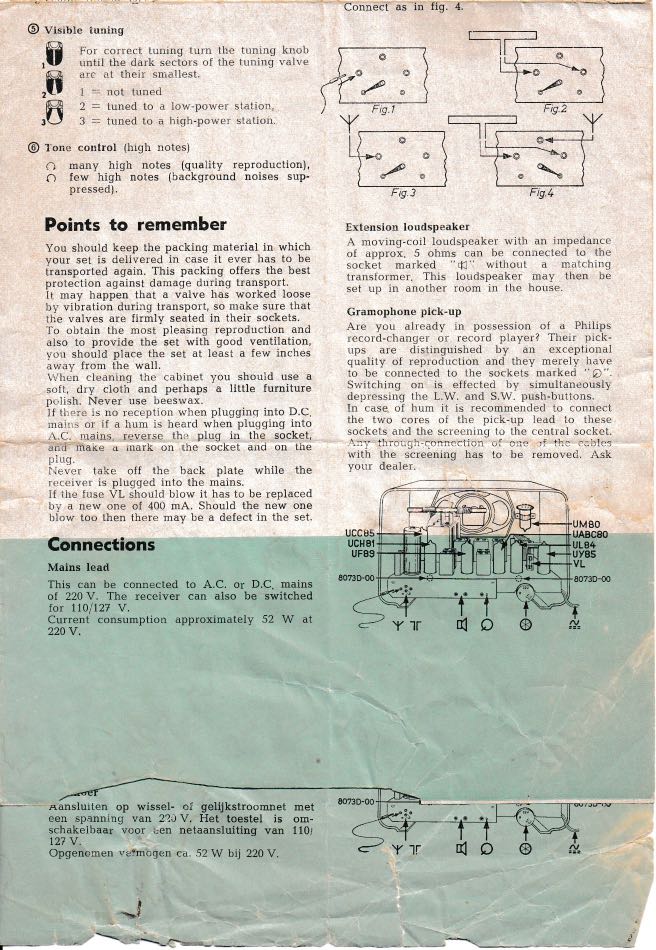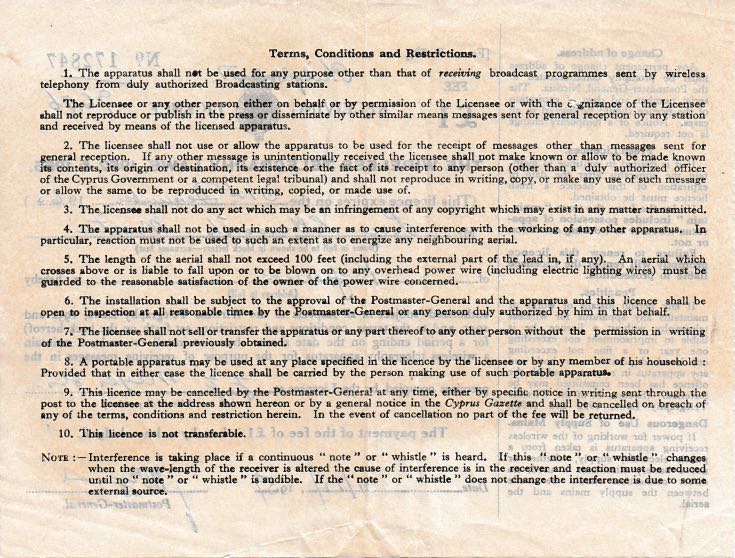Many thanks to SWLing Post contributor, Ted Lampert, who writes:
I was given some old radios belonging to a family member who passed a few years back.
A couple of them really sweet, a Philco 46-420, and a Philips B3X82U (see photo above).
Included was an envelope with some papers in it. One was the instruction booklet for the Phillips B3X82U, in multiple languages:
Another was a receiving license.
Without outing him too much, the original owner did government work and was stationed overseas quite a bit. The license looks like it was good for 1960, and I’m guessing you went to the post office to get it. It references the wireless telegraphy laws 1952 & 1955. Have you seen one of these before and do you know much about these receiving licenses?
The Philips is the radio I believe would have been probably what he got this license for since it says Philips at the top of it.
[…]Anyway, going through stuff recently, saw the license and started wondering about it.
Keep up the good work, seeing almost daily new articles on your site played a big part in keeping me inspired to get my own license, not a receiving one, but an amateur. Got general on the first try back in the fall of last year!
First of all, congratulations on snagging your General license last year! Well done!
Both the Philips and Philco are gorgeous receivers! What treasures! Ted, you had mentioned elsewhere in your message that you plan to recap them and I’m very pleased to hear this.
Like you, I was not aware of that receiving licenses were issued in the UK at the time. Perhaps this was implemented during or after WWII and was simply a requirement during the Cold War?
My hope is that a knowledgeable SWLing Post reader can shed some light on the Receiving License. Please comment with details!
Do you enjoy the SWLing Post?
Please consider supporting us via Patreon or our Coffee Fund!
Your support makes articles like this one possible. Thank you!







I remember reading that you still need a license it’s just that it’s free and you don’t need to apply, so everyone has one… That could be a misunderstanding based on a misreading relevant laws, or not seeing an update to the law.
You still can’t listen to anything other than Broadcast and Amateur transmissions without a licence/permission though. Not that anyone particularly cares unless you’re profiting or using it to break other laws.
Same in Israel, the fees funded IBA the public radio and TV.
The radio fee was part of the annual car license and the TV was separately.
If you had just a monitor without a tuner you had to submit official documents that this box can’t “decode” off air signals.
It was cancelled in 2015 but those who still has debts before that are still being run after.
According to the small print, the licence is specific to Cyprus so I guess the radios were used in part to listen to “Two-Way Family Favourites”, a staple of Sunday lunchtime listening when I was young and which, in part, sparked a life-long interest in international broadcasting.
The radio licence was first introduced as part of the Wireless Telegraphy Act 1923 during that November and cost ten shillings (10/-) (£0.50) per year. The start of television in 1927 did not require a licence. In June 1946, the licence was combined to include TVs and radios and cost £2 (actually, I think two guineas or £2/2/- or £2.10). The radio part was removed in February 1971. This was partly because radio/television detector vans, which were sent out to detect the LOs of receivers, were finding it increasingly difficult to detect transistorised radio receivers. TVs continued to have easily detectable LOs for many more years and the detector van operators could tell exactly which channel was being received and where it was being watched! I remember seeing our last combined licence. By the way, only very recently the licence finally became a single category – for many years you could buy a black and white or colour television licence. The final ‘crunch’ was that it was too expensive processing the last few (~8,000) B&W licences. Licences apply to each household.
In Canada there was a receiving license too.
I’ve never really seen much about it, but the old radio in the living room that had shortwave (and hence was where I first heard shortwave fifty years ago) had a Canadian license stapled inside the wooden cabinet. I recall it was dated from the WWII era. I din’t have the license or the radio.
I’ve mentioned it elsewhere and got brief comments, but I can’t remember any details, and I don’t think the replies were detailed. I don’t think it was just a WWII thing, but it was in the past in 1970.
Up until I beleive the late 1980’s, The UK required a license for any type of receiving equipment. the license fee funded the BBC. When television was introduced to the UK in 1936, a separate license was needed for any Television as well. While the Radio receiver license has been phased out the TV license remains.